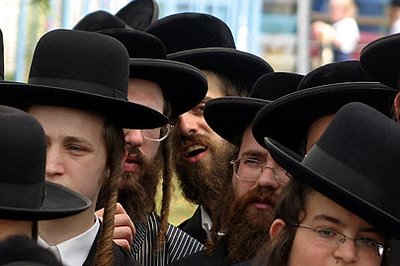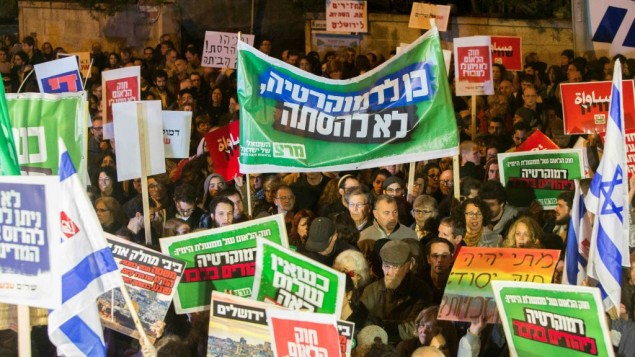Israel is in the midst of a deep political crisis, and oddly enough, it is not intimately related to the Israeli-Palestinian conflict. Instead, this crisis centers on a decades-old question: who has the right to be exempt from service in the Israeli military?
In February, the Israeli Supreme Court struck down the “Tal Law”, which governed exemptions for Jewish ultra-Orthodox or “Haredi” communities, as unconstitutional. Benjamin Netanyahu’s right-leaning coalition government was given until the end of July to pass a new law. The previous law had allowed deferment of military service for Haredi men to study in yeshivas or religious academies, which in practice often meant a de-facto exemption. It also allowed Haredi women exemptions from any form of mandatory service, civilian and military.
This issue had been the subject of political compromise since the founding of the State of Israel. Special exemptions for a small number of yeshiva students were given to the Haredi by Israel’s founding Prime Minister, David Ben-Gurion, as a means of enlisting their initially shaky support for the fledgling democratic state. Until recently this initial bargain had not been a large issue for the state, which had a strong majority of mostly secular Jews. However, with increasing demographic and social changes, this compromise has become increasingly problematic. The growth of the Haredi and Arab shares of the population within Israel compared to secular Jews, along with decreased social pressure against draft dodging, have transformed a military with nearly universal Jewish participation into an institution that successfully drafts fewer and fewer Israelis every year. Sherut Leumi, or national service, which encompasses volunteering in schools, hospitals and other public institutions, was designed as an alternative to military service. But with few participants and the diminishing social and economic benefits of national service for the draftee, this auxiliary plan has largely failed.

Another issue that has surfaced is the theological and cultural barriers to integration of the Haredim and Israeli Arabs into the military. Haredim and the “National Religious”, or non-Haredi Orthodox nationalists, have demanded special accommodations within their military service. These include stricter gender segregation, with a recent refusal by a group of Orthodox servicemen to attend an event at which female soldiers were singing only the most publicized incident. Another accommodation has been a program called Hesder, which combines religious study in a yeshiva with limited military service, usually a year and four months as opposed to the regular mandatory three years for men.
Arab citizens have also been resistant to serve. While most members of the tiny Druze minority serve (as do a sizeable but decreasing portion of Bedouin Arab men), the majority of Israeli Arab Muslims and Christians refuse to volunteer for either national or military service. For a variety of reasons, the number of military recruits has been shrinking by the low hundreds every year. This has included feelings of alienation from Israeli society, resistance among Arabs to participating in the ongoing occupation of the Palestinian Territories, as well as social pressure within the Arab community to not be perceived as “collaborators”. These problems of integration stretch the military’s capacity already, hampering the potential for reform.
With the sudden demise of the Tal Law, the issue was forced upon a highly fractious and disunited country with a legislature that reflects the lack of political consensus. The two largest parties in Israel, the centrist Kadima and the right-wing Likud hold 28 and 27 seats, respectively, in the 120-seat Knesset. The remainder of the seats is split amongst a menagerie of smaller parties: the secular ultra-nationalist Yisrael Beiteinu, Defense Minister Ehud Barak’s breakaway “Independence” faction of the center-left Labour Party, and the two Haredi parties of Shas and United Torah Judaism united with Likud in a shaky coalition government.
This government pledged to replace the expiring law with one that would increase participation among the Haredi and Arab communities. A surprising move by the new leader of Kadima, Shaul Mofaz, to join the government, enhanced hopes that a comprehensive reform of military service and the relationship between the state and the marginalized Haredi and Arab minorities would be possible. However, this pact quickly broke down, with Kadima leaving the coalition only a month after joining over a rejected proposal to draft 50 per cent of Haredi Jews, or Haredim, for military service, with the other half being drafted for civilian service. The Haredi parties had threatened to withdraw from the coalition over legal sanctions against Haredi draft dodgers, while Yisrael Beiteinu had demanded similar efforts made towards the Israeli Arab community, something Kadima was unwilling to do. Since August 1, the Tal Law has expired, and without a replacement, immediate mass conscription of Haredi men is imminent, with the first round of full conscription beginning in November. This extreme option, favoured by no one, would create significant problems for the military and likely will lead to a mass dodging of the draft by Haredi conscripts and massive protests throughout Israel.
Israel needs to have a real political conversation, not kick the can down the road once again. The Haredim and Israeli Arab populations, as a share of Israel’s total population, are large and growing. Military service has acted as the key gateway to middle-class employment in Israel; few businesses will hire people without military service on their résumé, and the lifelong connections made through service are essential when starting a business or finding a job. This has meant that Haredim and Israeli Arabs have often remained mired in poverty, with high unemployment rates and in need of increased public assistance, a heavy burden for Israel’s government and economy. Alienation from mainstream Israeli society has affected both communities, as their members do not participate in one of the premier institutions of Israeli society. While any plan attempting to solve this puzzle will be controversial, and will likely be unpopular with Israel’s religious right and its Arab citizens, it is necessary for the future of Israel as a Jewish state. Without a broad-based “peoples’ army”, one of the institutional pillars of the Israeli state and Israeli society, Israel’s internal disunity will become increasingly pronounced, and efforts to solve its many problems, both external and internal, will become harder.




